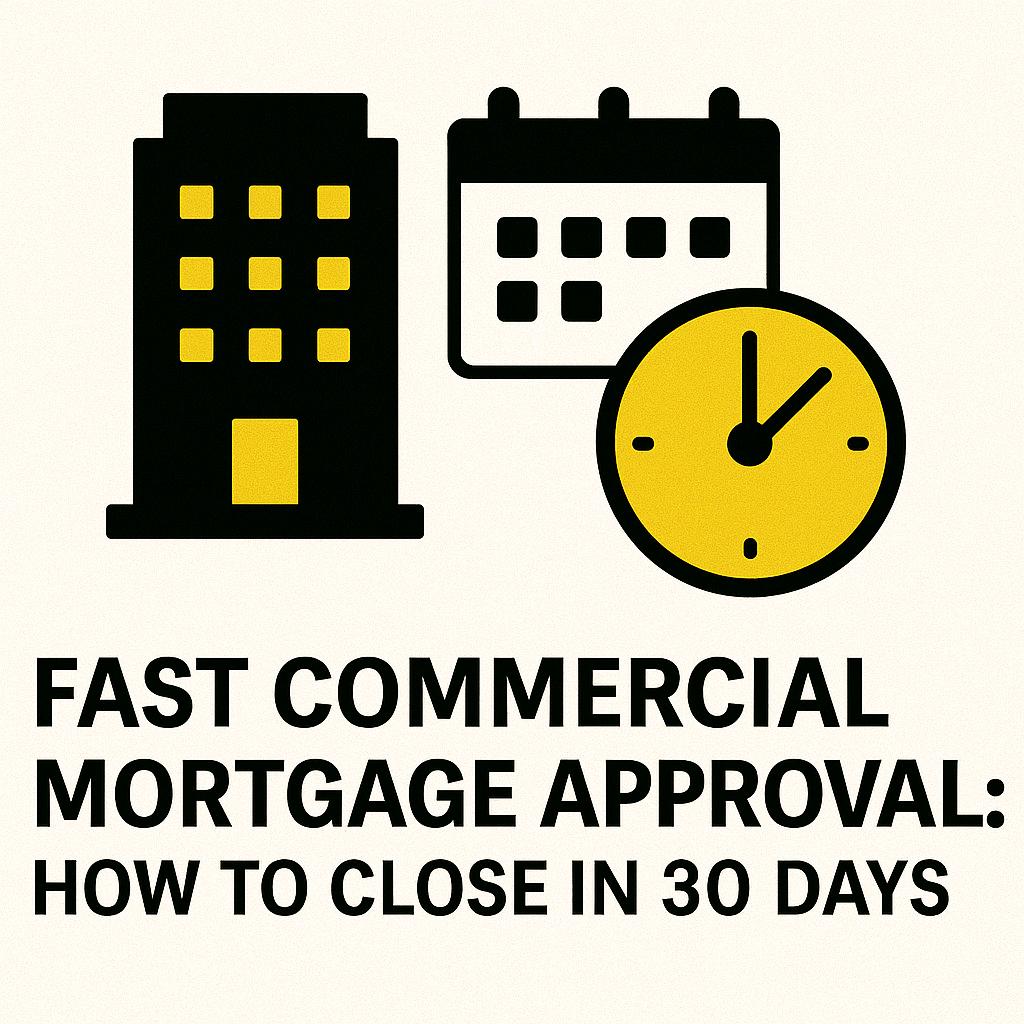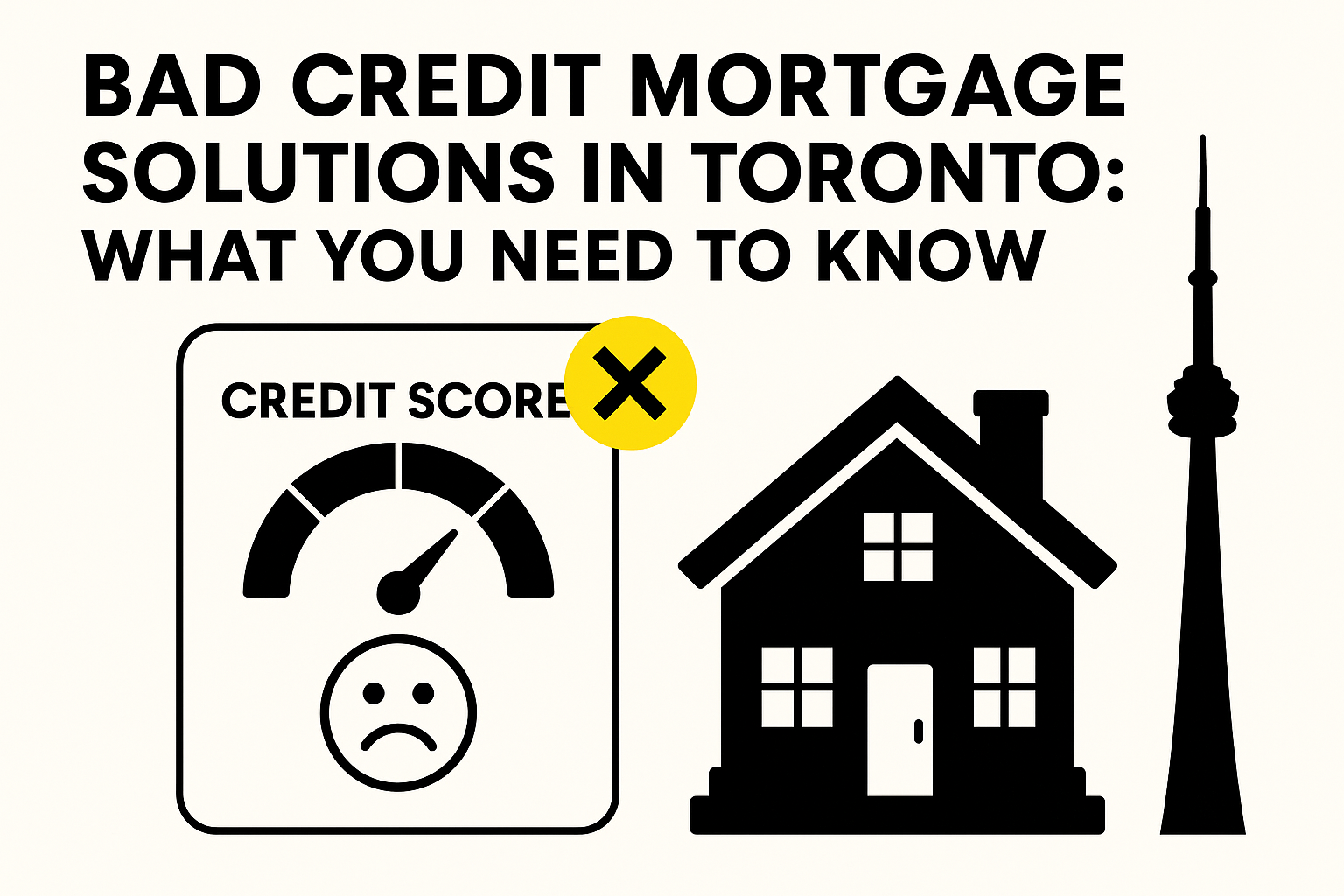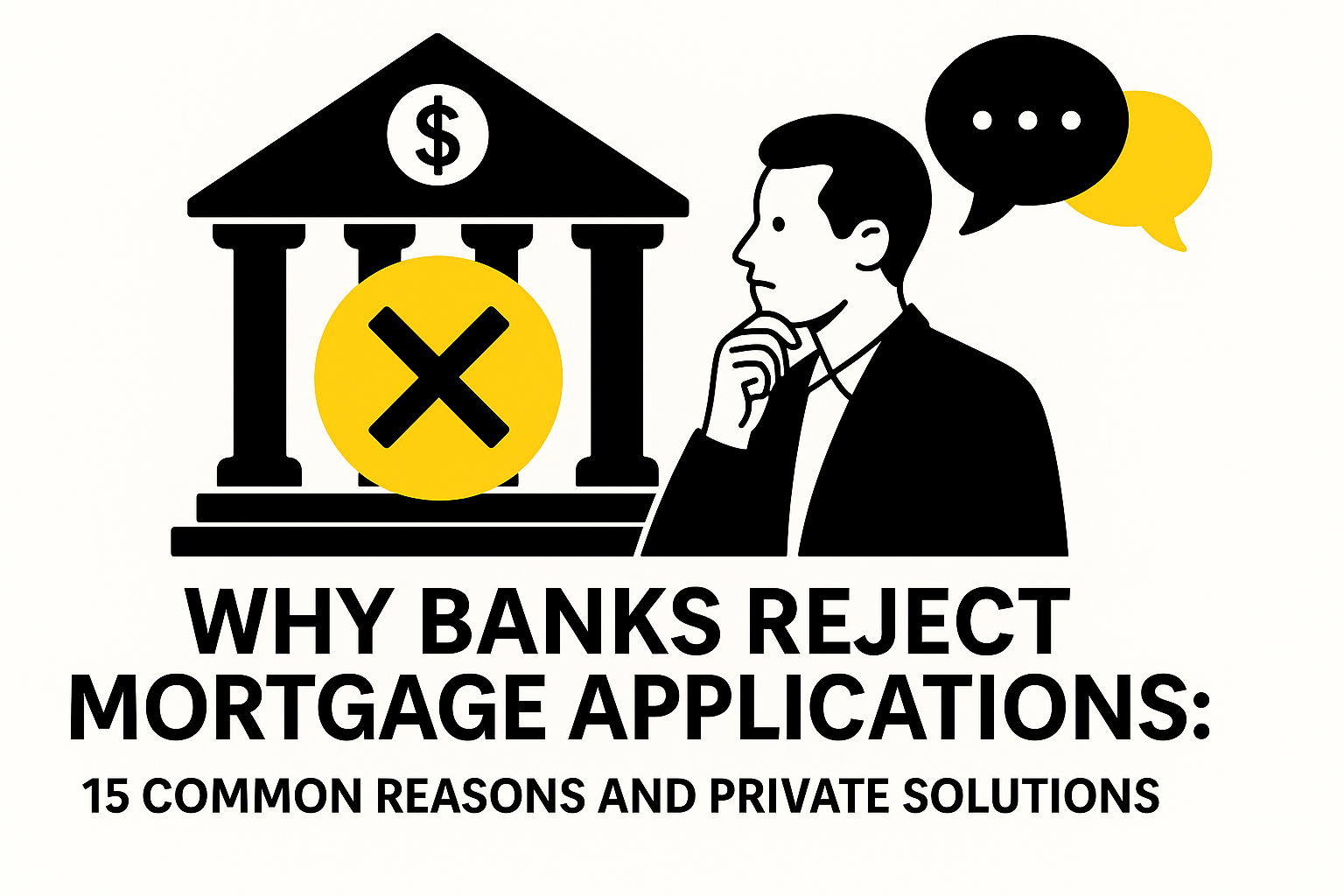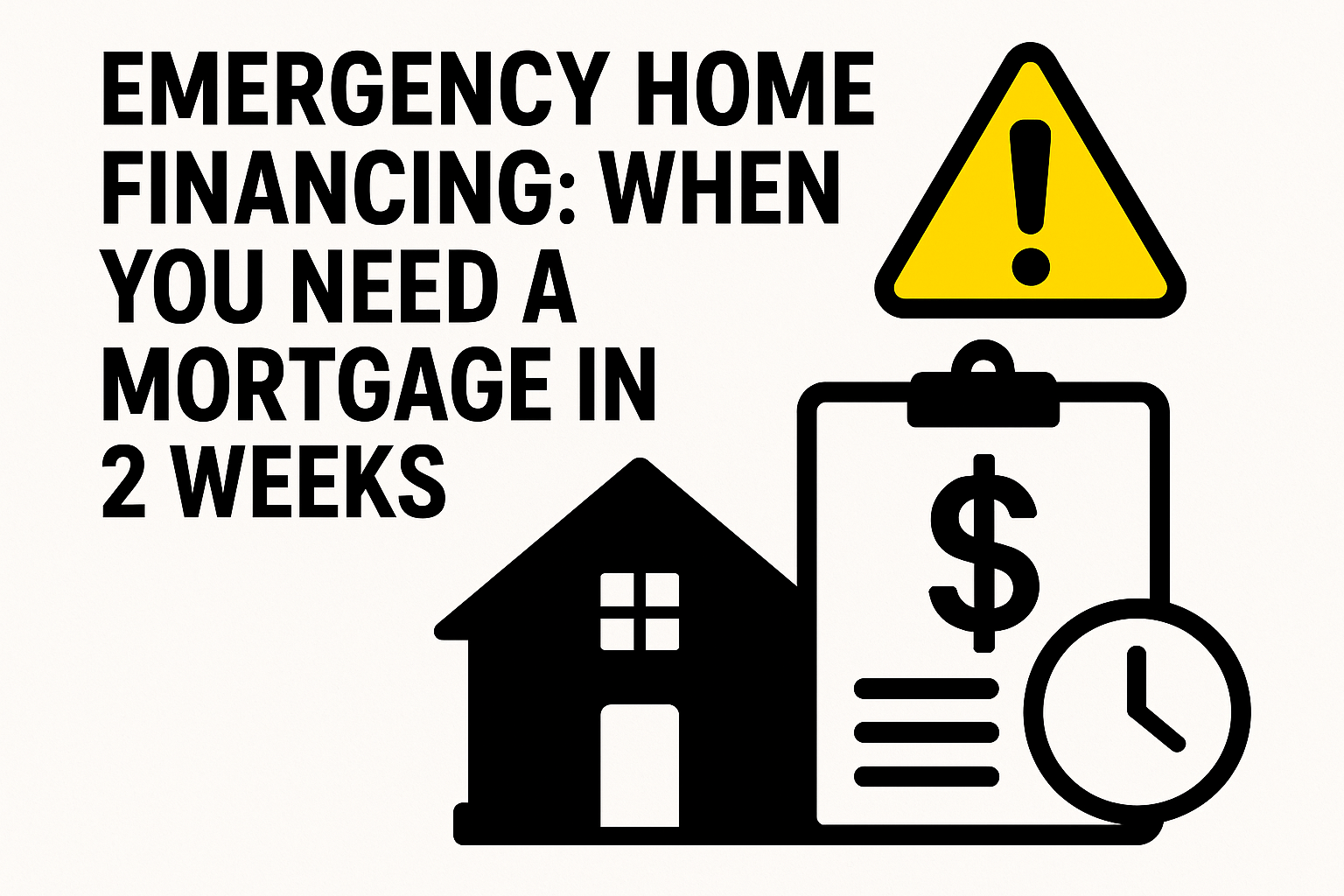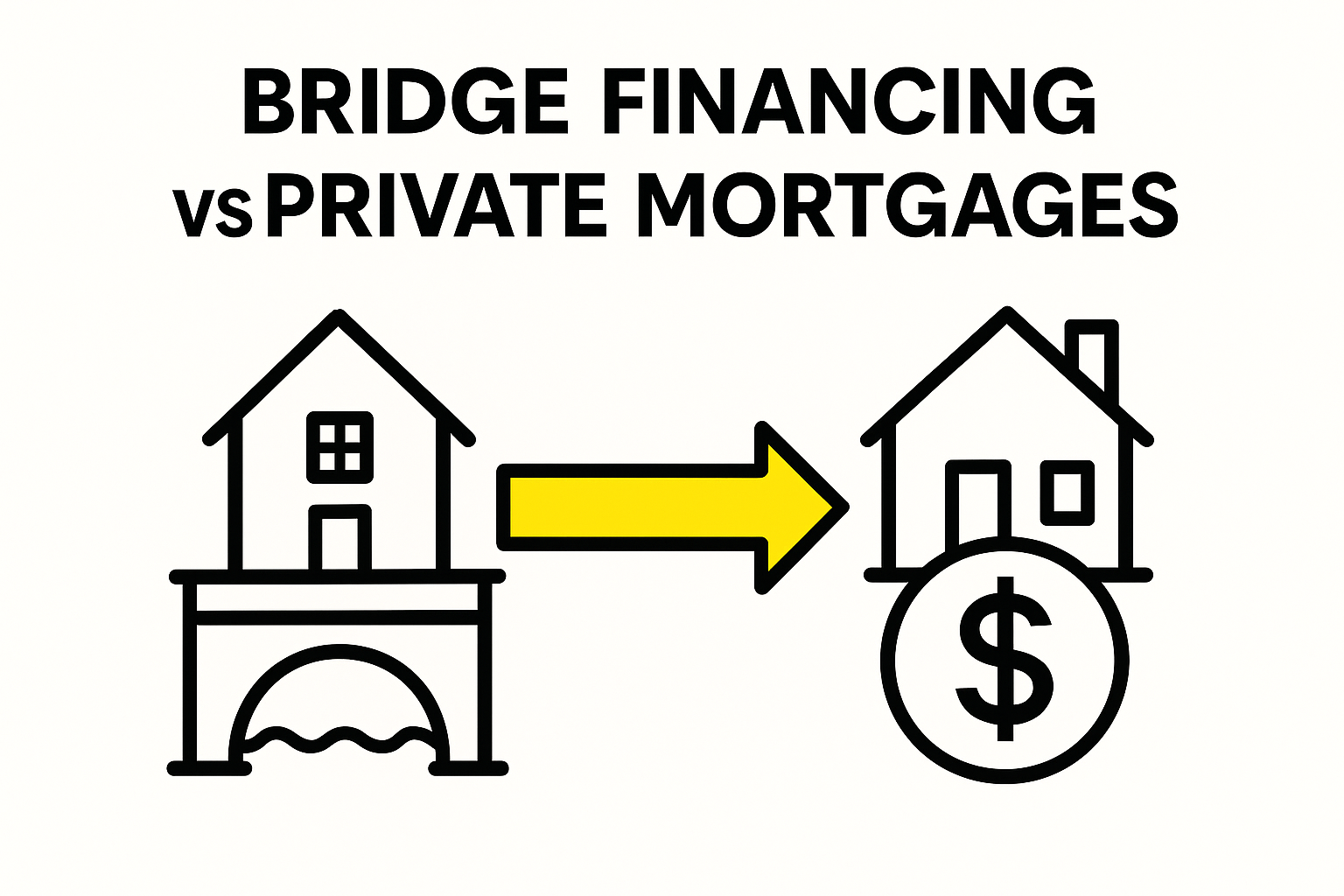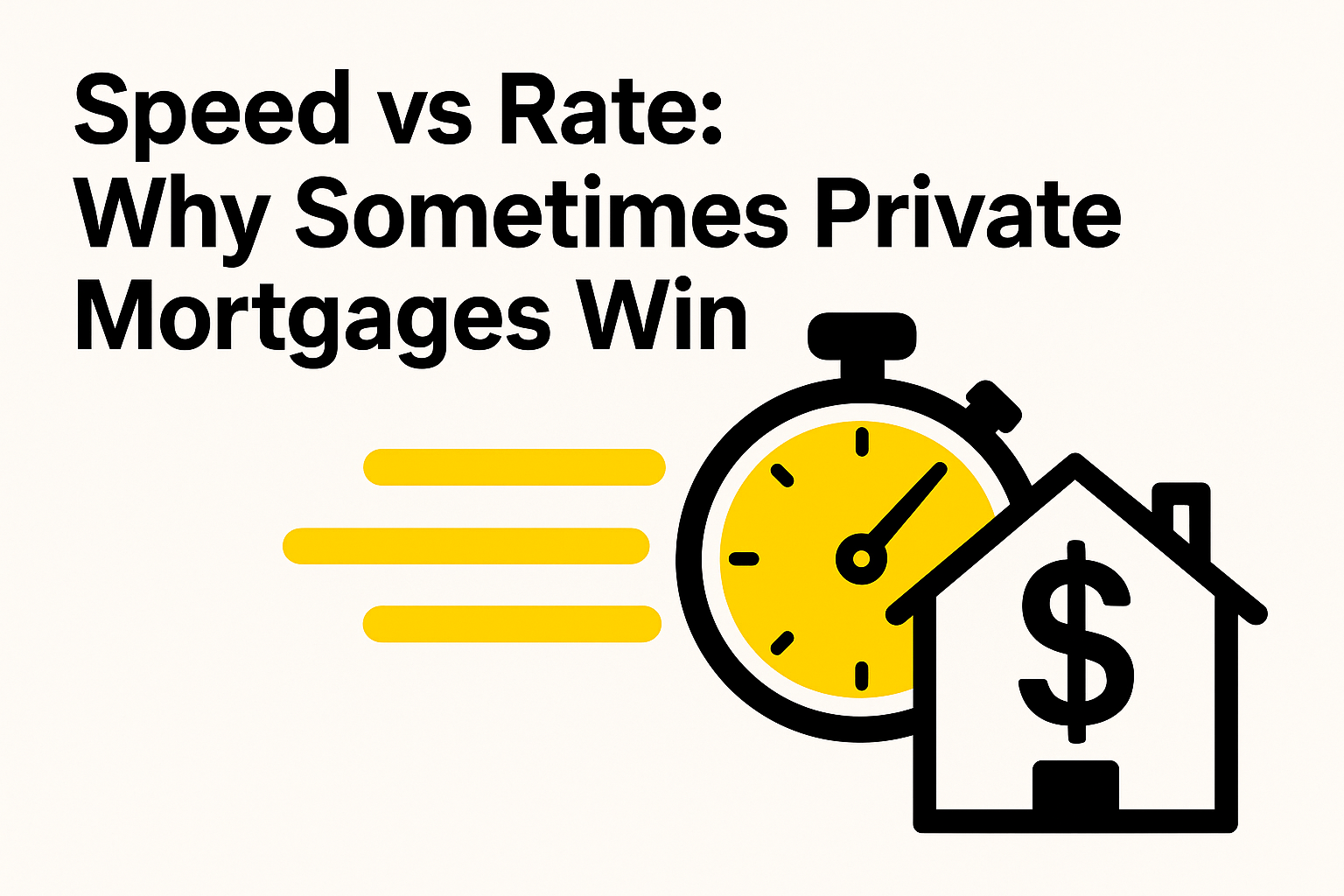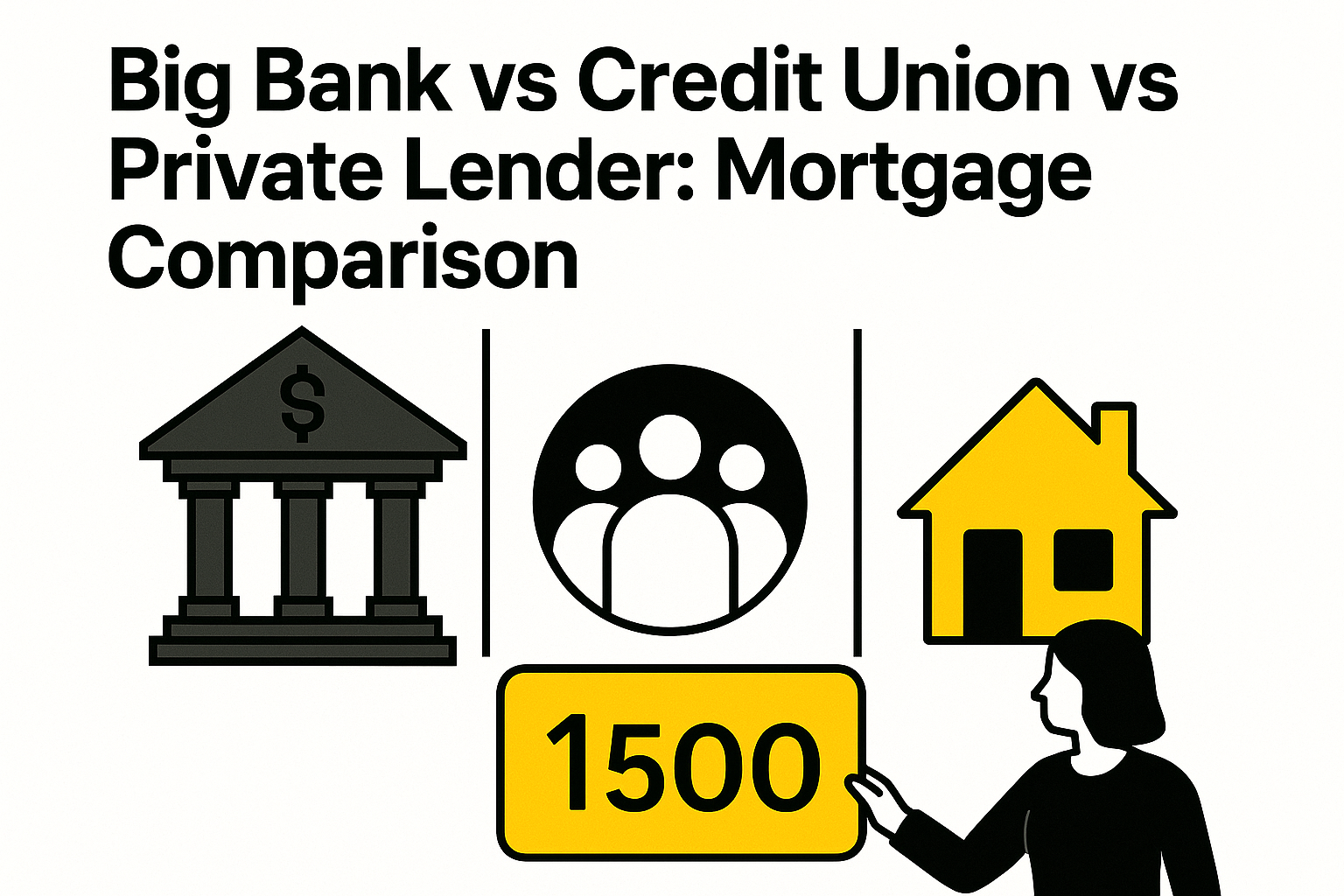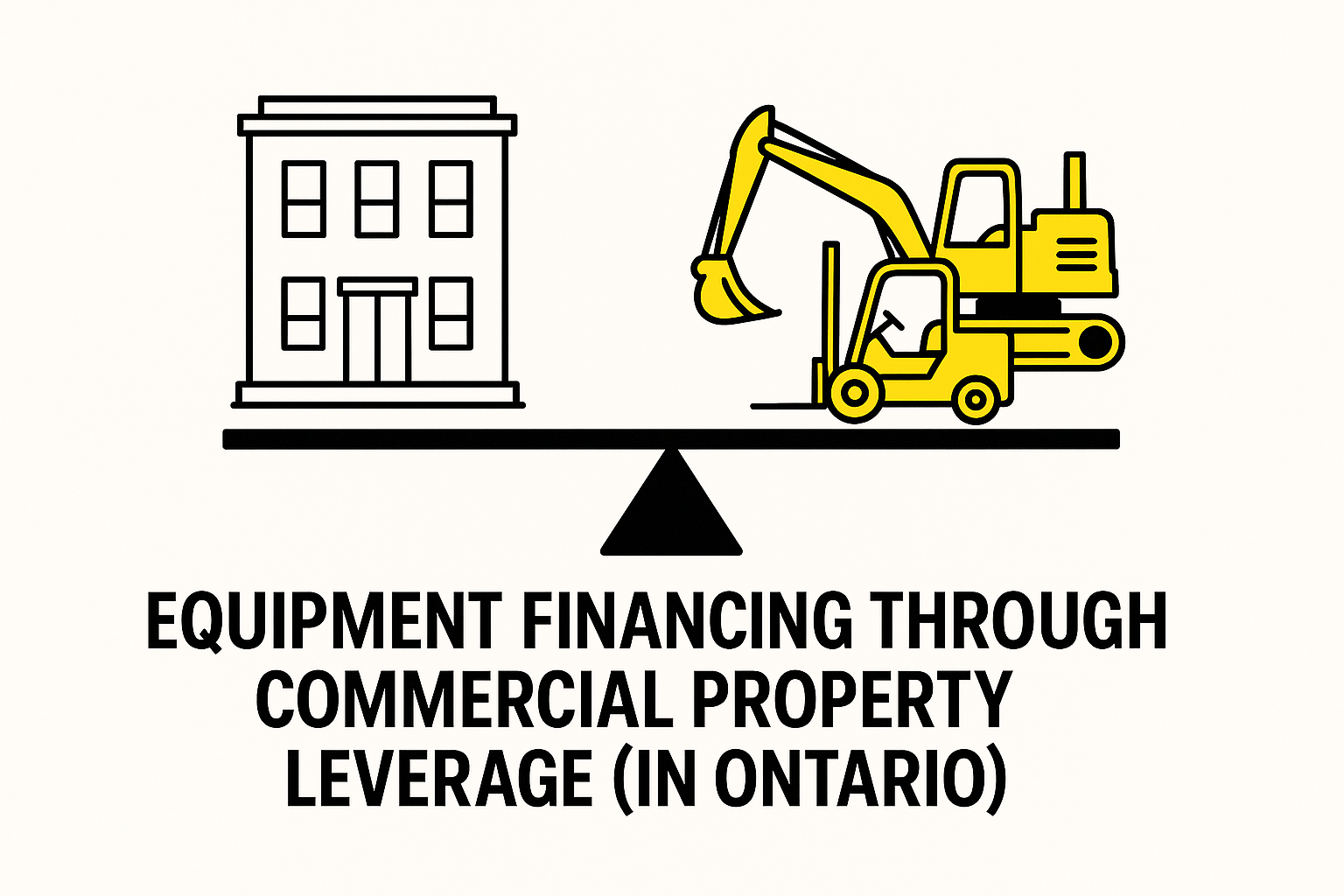Picture discovering a prime commercial building in downtown Toronto with immediate cash flow potential, excellent tenant mix, and below-market pricing due to the seller’s urgent relocation timeline, only to watch the opportunity slip away because your traditional bank needs 90-120 days for commercial mortgage approval while three other investors with faster financing sources submit competitive offers within the 45-day closing window the seller demands. This hypothetical scenario plays out monthly across Canada’s commercial real estate markets, where the best investment opportunities often require speed and certainty that traditional commercial lending simply cannot provide within competitive timeframes. The investors who consistently win the best deals aren’t necessarily those with the most capital or highest credit scores – they’re the ones who understand how to structure financing that can close within 30-45 days when market conditions demand immediate action.
What separates successful commercial investors from those who perpetually lose deals to financing delays is understanding that commercial real estate operates on different timelines than residential markets, with sellers often motivated by business needs, development deadlines, or market timing that won’t accommodate traditional bank processing schedules. Fast commercial mortgage approval requires strategic lender selection, pre-positioning, and documentation preparation that aligns financing timelines with market realities rather than banking convenience. The commercial investors who thrive are those who treat financing speed as a competitive advantage worth optimizing rather than accepting traditional lending delays as inevitable obstacles to deal success.
Why Traditional Commercial Mortgages Take So Long
Complex Property Valuations and Appraisals
Commercial property appraisals involve extensive analysis of income statements, comparable sales, replacement costs, and market conditions that require significantly more time than residential valuations. Commercial appraisers must evaluate tenant quality, lease terms, rental markets, and property-specific factors that can take 2-4 weeks to complete properly.
Income-producing properties require detailed financial analysis including operating statement verification, rent roll analysis, and cash flow projections that traditional appraisers approach conservatively, often requesting additional documentation or clarification that extends timelines beyond initial estimates.
Specialized property types like hotels, gas stations, or medical buildings may require appraisers with specific expertise who aren’t immediately available, creating scheduling delays that can extend valuations by weeks in markets with limited specialized appraiser availability.
Multi-Layer Approval Processes
Traditional commercial lenders operate with committee-based approval processes involving multiple departments, senior management review, and risk management oversight that creates sequential delays rather than parallel processing of application components.
Credit departments, underwriting teams, legal review, and final approval authorities often work independently with handoff delays between departments that can add weeks to processing timelines even when individual reviews proceed efficiently.
Large bank bureaucracies prioritize risk management over speed, requiring extensive documentation review, policy compliance verification, and senior management sign-off that doesn’t accommodate competitive commercial real estate timelines.
Due Diligence Requirements That Extend Timelines
Traditional commercial lenders require extensive due diligence including legal title review, environmental assessments, structural inspections, and financial audits that each involve third-party professionals with their own scheduling constraints and processing timelines.
Property condition assessments, environmental Phase I studies, and engineering reports typically require 2-3 weeks each, assuming immediate scheduling availability and no complications that require additional investigation or clarification.
Legal documentation review for commercial mortgages involves complex agreements, security registration, and compliance verification that legal departments approach methodically rather than urgently, adding weeks to completion timelines.
Essential Elements for 30-Day Commercial Closings
Pre-Approval Strategies That Actually Work
Effective commercial mortgage pre-approval requires establishing relationships with lenders who specialize in fast commercial closings and understand the documentation and processes necessary to meet competitive timelines consistently.
Pre-approval involves more than traditional income verification – it requires lender comfort with your investment strategy, property preferences, and financial capacity that enables them to move quickly when specific opportunities arise.
Successful pre-approval includes preliminary underwriting of your financial profile, establishment of lending parameters for property types and price ranges, and lender commitment to priority processing when you identify target properties.
Documentation Preparation and Organization
Fast commercial closings require complete documentation packages prepared in advance rather than assembled during application processing when time pressures create delays and errors that extend approval timelines.
Financial documentation should include 3+ years of personal and business tax returns, current financial statements, bank statements, and investment portfolio summaries organized for immediate lender review without additional requests for clarification.
Property analysis capabilities including due diligence checklists, inspection coordination, and professional service provider networks enable rapid property evaluation that supports fast lending decisions based on complete information.
Property Selection for Fast Approvals
Properties that close fastest typically involve standard asset classes with clear income streams, established tenant bases, and straightforward operating structures that lenders can evaluate quickly without extensive specialized analysis.
Multi-family residential properties, office buildings with established tenants, and retail properties with national chain tenants represent property types that most commercial lenders understand well and can underwrite efficiently.
Properties with clean environmental records, recent capital improvements, and professional management create fewer due diligence complications that might extend approval timelines or trigger additional investigation requirements.
Alternative Commercial Lenders for Speed
Private Commercial Mortgage Specialists
Private commercial lenders specialize in speed and flexibility, often approving commercial mortgages within 1-2 weeks and funding within 30 days when traditional banks require 90+ days for similar transactions.
Private commercial lending focuses on property value, borrower experience, and deal structure rather than extensive committee review processes, enabling faster decision-making that aligns with competitive market timelines.
Private lenders often have specialized expertise in specific property types or markets that allows them to evaluate opportunities quickly without the extensive due diligence processes that traditional banks require for unfamiliar assets.
The premium rates that private commercial lenders charge often prove cost-effective when speed enables acquisition of superior properties at better prices than would be available through slower traditional financing processes.
Non-Bank Institutional Lenders
Credit unions, pension funds, and specialized commercial lending institutions often provide faster approval than traditional banks while maintaining competitive rates and professional underwriting standards.
These institutional lenders may have streamlined processes specifically designed for commercial real estate investors who need faster closing capabilities than traditional bank bureaucracies can provide.
Non-bank lenders often maintain smaller, more specialized teams that can make decisions quickly without the multiple approval layers that characterize large bank commercial lending departments.
Bridge Lending for Immediate Closings
Commercial bridge loans provide immediate funding for property acquisition with refinancing to permanent commercial mortgages after closing, separating purchase speed from long-term financing optimization.
Bridge lending can close within 1-2 weeks for qualified borrowers with clear exit strategies, enabling property acquisition in competitive situations where traditional financing timelines would eliminate opportunities.
The temporary higher cost of bridge financing often proves worthwhile when it enables acquisition of properties that appreciate or generate cash flow during the bridge period, offsetting additional interest costs.
Property Types That Close Fastest
Multi-Family Investment Properties
Multi-family properties with established rental income, professional management, and standard financing structures typically receive fastest commercial mortgage approval due to lender familiarity and straightforward underwriting processes.
Apartment buildings, townhouse complexes, and residential rental properties provide predictable cash flows that lenders can evaluate quickly using standard income capitalization methods without extensive specialized analysis.
Properties with long-term leases, stable tenant bases, and professional property management create fewer due diligence complications that might extend approval timelines or require additional investigation.
Commercial Office Buildings
Office buildings with established tenant bases, professional management, and standard lease structures provide clear income streams that commercial lenders can evaluate efficiently using established underwriting criteria.
Single-tenant buildings with creditworthy corporate tenants or multi-tenant properties with diversified income sources represent straightforward investment opportunities that don’t require extensive specialized analysis.
Properties in established office markets with professional management and recent capital improvements create fewer due diligence complications that might extend approval processes or trigger additional requirements.
Retail and Industrial Assets
Retail properties with national chain tenants, established shopping centers, and stable income streams provide clear investment fundamentals that commercial lenders can evaluate quickly using standard retail metrics.
Industrial properties including warehouses, distribution centers, and manufacturing facilities with established tenant bases and standard lease terms represent straightforward commercial investments that lenders understand well.
Properties with triple-net leases, creditworthy tenants, and minimal landlord responsibilities create simplified cash flow analysis that supports faster underwriting and approval processes.
The 30-Day Commercial Closing Timeline
Week 1: Application and Initial Underwriting
Days 1-2: Submit complete application package including financial documentation, property information, and preliminary due diligence materials to pre-selected commercial lender with fast-closing capabilities.
Days 3-5: Lender conducts initial underwriting review, property evaluation, and borrower qualification assessment while coordinating property appraisal and environmental assessment scheduling.
Days 6-7: Initial approval or feedback provided with conditions list, additional documentation requirements, and confirmation of timeline feasibility for target closing date coordination.
Week 2: Property Valuation and Due Diligence
Days 8-10: Property appraisal conducted, environmental Phase I assessment initiated, and property condition evaluation completed by qualified professionals with expedited scheduling arrangements.
Days 11-12: Financial analysis of property income statements, rent rolls, and operating expenses completed with tenant verification and lease analysis as required for underwriting.
Days 13-14: Initial property valuation completed, due diligence reports submitted, and preliminary lending decision provided with final conditions for approval completion.
Week 3: Final Approval and Documentation
Days 15-17: Final underwriting review completed, formal approval issued, and legal documentation preparation initiated with expedited legal review and processing arrangements.
Days 18-19: Mortgage commitment letter issued, legal documentation review completed, and closing coordination initiated with legal counsel and title company professionals.
Days 20-21: Final conditions satisfied, legal documentation executed, and funding arrangements finalized with confirmation of closing date and fund transfer procedures.
Week 4: Legal Completion and Funding
Days 22-24: Final legal review completed, title insurance arranged, and closing statements prepared with all parties coordinated for settlement execution within target timeline.
Days 25-27: Legal closing executed, mortgage registration completed, and fund transfers processed with property ownership transferred and lender security interests registered properly.
Days 28-30: Final documentation completed, insurance arrangements finalized, and post-closing requirements satisfied with borrower access to property and cash flow management initiated.
Here’s your 30-day commercial closing timeline:
| Week | Key Milestones | Critical Actions | Potential Delays |
| Week 1 | Application submission, initial review | Complete documentation, appraisal scheduling | Missing financial records |
| Week 2 | Property valuation, due diligence | Environmental assessment, income verification | Appraisal complications |
| Week 3 | Final approval, legal documentation | Mortgage commitment, legal review | Condition satisfaction |
| Week 4 | Closing execution, funding | Legal completion, registration | Title or insurance issues |
This timeline provides realistic milestones for 30-day commercial mortgage closings while identifying potential delay points requiring attention.
Documentation Checklist for Speed
Financial Statements and Tax Returns
Personal and business tax returns for 3+ years, current financial statements, bank statements for 6+ months, and investment portfolio summaries should be organized and readily available for immediate lender review.
Business financial documentation including profit and loss statements, balance sheets, cash flow statements, and accountant-prepared financial summaries provide lender confidence in borrower financial capacity.
Debt schedules, asset summaries, and liquidity demonstrations including available cash, credit facilities, and investment accounts support lending decisions and eliminate requests for additional financial clarification.
Property Operating Statements
Current rent rolls, lease summaries, and tenant payment history provide essential income verification that commercial lenders require for property valuation and cash flow analysis.
Operating expense documentation including property taxes, insurance, maintenance, management fees, and capital improvements demonstrate property operating efficiency and cash flow reliability.
Property management reports, occupancy statistics, and market rental comparisons support income projections and property valuation assumptions that underpin lending decisions.
Environmental and Structural Reports
Recent environmental Phase I assessments, structural engineering reports, and property condition evaluations eliminate due diligence delays when reports are current and comprehensive.
Professional inspection reports addressing mechanical systems, roofing, structural integrity, and code compliance provide lender confidence while avoiding extended due diligence timelines.
Environmental compliance documentation, hazardous material assessments, and regulatory compliance reports eliminate potential complications that might extend approval processes or require additional investigation.
Additional resources for commercial real estate financing are available through Commercial Real Estate Development Association and Mortgage Professionals Canada.
Working with Commercial Mortgage Specialists
Selecting Speed-Focused Lenders
Choose commercial lenders with proven track records of fast closings, established processes for expedited approval, and team structures designed to meet competitive timeline requirements consistently.
Lender specialization in your target property types, market areas, and deal sizes ensures efficient processing by professionals who understand your investment strategy and can evaluate opportunities quickly.
Established relationships with commercial mortgage specialists provide priority processing, streamlined documentation requirements, and coordinated service that eliminates delays common with new lender relationships.
Optimizing Lender Communication
Maintain regular communication with commercial lending teams, provide updates on deal progress, and respond immediately to documentation requests or condition requirements that might delay approval timelines.
Professional preparation including organized documentation, clear deal summaries, and complete information packages demonstrates borrower sophistication and reduces lender review time requirements.
Proactive problem-solving including addressing potential issues before they become complications and providing alternative solutions maintains deal momentum when challenges arise during processing.
Frequently Asked Questions
Is 30-day commercial mortgage approval realistic for all property types? 30-day closings are realistic for standard commercial properties with experienced borrowers and fast-closing lenders. Complex properties or unique situations may require 45-60 days even with expedited processing.
How much more do fast commercial mortgages cost compared to traditional bank financing? Fast commercial mortgages may cost 0.5-2% more than traditional bank rates, but this premium often proves cost-effective when speed enables acquisition of superior properties or competitive advantages.
What documentation is most critical for fast commercial mortgage approval? Complete financial statements, property operating statements, recent appraisals or property condition reports, and organized legal documentation are essential for eliminating delays during processing.
Can bridge financing really close commercial deals in 1-2 weeks? Yes, experienced commercial bridge lenders can close qualified transactions within 1-2 weeks for borrowers with strong financial profiles and clear exit strategies for permanent financing.
Should I pay for property reports before getting mortgage approval? For competitive deals requiring fast closing, ordering appraisals and environmental reports immediately can eliminate delays, though this requires confidence in deal completion and lending approval.
How do I find commercial lenders who can close within 30 days? Work with commercial mortgage brokers who specialize in fast closings, research private commercial lenders, and ask for references from other commercial real estate investors in your market.
Conclusion
Fast commercial mortgage approval requires strategic preparation, lender selection, and process optimization that treats financing speed as a competitive advantage rather than accepting traditional banking delays as inevitable obstacles to deal success. The commercial real estate investors who consistently win the best opportunities are those who understand that superior properties often require immediate action, making financing speed as important as financing terms in overall investment strategy. Success in competitive commercial markets demands relationships with lenders who specialize in fast closings, documentation preparation that eliminates processing delays, and deal structuring that aligns financing timelines with market realities rather than banking convenience.
The key to consistent 30-day commercial closings lies in understanding that speed requires premium preparation – better documentation, stronger lender relationships, and more sophisticated deal analysis than slower traditional financing approaches demand. Commercial investors who master fast financing capabilities gain access to opportunities that others miss while building track records of successful deal execution that attract better properties and more favorable lending terms over time, creating competitive advantages that compound throughout their investment careers.
Need fast commercial mortgage approval for your next deal? Contact HERCULES Team Investment Group today to explore commercial lending solutions designed for competitive timelines, offering the speed and certainty required to win superior commercial real estate opportunities in today’s fast-moving markets.

